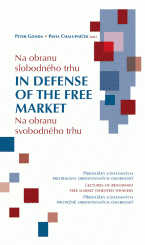 |
|||||||
| INSTITUTE | CONSERVATISM | M.R.STEFANIK |
| CONSERVATIVE LETTERS
|
[04.02.2008, Matej Steinbacher, CONSERVATIVE LETTERS]
Talking about the Euro is talking about which central authority should be trusted the managing of the monetary policy. This means which central authority should set interest rates, which central authority should issue money, etc. And no matter who is appointed the task to manage monetary policy it remains centrally managed. It is widely accepted that the only task of the central bank should be to maintain the price stability at least since the late Milton Friedman’s address that the monetary policy must be vigilant about anchoring inflation expectations. Saying more practically this means that central bank must pursue a restrictive monetary policy as more money in the economy produces only inflation. Although it passed more than 30 years when Milton Friedman’s contribution that “money matters” was awarded a Nobel Prize, it looks that not all central bankers have anticipated Friedman’s main point that issuing money makes inflation. This is what Prof. Vukotić from Montenegro had in mind when saying: “Topčider is too close from here.” Of course, everybody that used to live in Yugoslavia knows that this money printing firm in Serbia is a synonym for the excessive money supply which engendered very high inflation in the past. High inflation, of course, ruined people’s perception about prices, it made savings undesirable, and aggravated business planning and investments. People’s reaction followed as practically all people perceived German Mark as an unofficial legal tender. And some countries, like Montenegro even officially adopted first German Mark and now Euro as a legal tender and that’s why the idea over the exchange rates has been so profound in CEE countries and goes back to the early nineties. Let it be pegging national currency to some other, low inflation currency, like German Mark, running under the currency board etc. and now it is about the Euro. What is so surprising is that most (if not all) CEE citizens that have got the opportunity to join Euro foster their sympathies towards it out of the prestigious manners where practically no discussion has been devoted to potential pitfalls of such a step. Most people are in favor of the Euro idea out of practical reasons, like no need for changing money when going abroad, and it looks that in this euphoria hardly anyone things about anything but to adopt it. But the adoption of any other currency like Euro is more than this! We all know that not all EU countries have joined Euro but have persisted in having their own currency, like Denmark, Great Britain, and Sweden have not joined. Above all, a common currency area and the centralization of the decision-making means that one fits all monetary policy of all Euro countries is run from Frankfurt and news about the interest rates, liquidity influxes have become the most desirable piece of information to most investors. It is very likely that a policy that would be good for one country could prove detrimental for another and vice versa. What can be said about Slovenia that has joined the group on January 1st, 2007? Joining the system of exchange rate mechanism (ERM-II) in 2004 contributed to the significant inflation reductions. During this process Slovenia also had to remove all monetary restrictions, especially capital controls that prevented bigger capital inflows from abroad. Businesses and banks intensified their borrowing on international financial markets that offered loans under more favorable conditions than the locals. All this contributed to the improvement of the environment both, for the people and especially businesses. However, many have realized that nothing importantly changed to them with the introduction of Euro except paying with Euros. Especially not higher wages or income as some might have thought. We all know that it is the productivity that influences both and not the name of the money we use. Here, many countries, like Iceland, Lichtenstein or Switzerland to mention just some have proved that it is even not necessary to join European Union needles to say Euro to be prosperous. All that counts regarding the monetary policy is to stick to the old Friedman’s recommendation and to preserve price stability. Author serves as President at Free Society Institute, Slovenia. Article was published in Slovak language in Conservative Letters 01/2008, a newsletter of the Conservative Institute. |
 English | Slovak
English | Slovak
This website was created also thanks to funding granted by The Trust
for Civil Society in Central and Eastern Europe.
Website powered by Metafox CMS from Platon Group.
|
Conservative Institute of M. R. Stefanik |
Tel.:
+421 258 100 188 |







